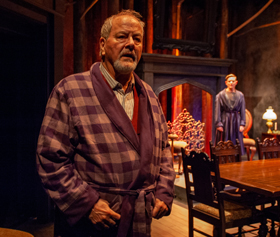
Sowerby's bitter portrait of an industrial clan in Northern England is anchored by the manufacturing firm referenced in the play's title. The original Rutherford "son" is now its owner, having devoted his life to the enterprise bequeathed him by its founder. His obsession with its success—and with the worthiness of his heirs to preserve its legacy—leads him to regard the latter exclusively in terms of their utility.
Even without hindsight granting us cognizance of the realignment in the national order brought about by a World War two years later, there is no denying the continued immediacy of intergenerational conflict arising from parental injunctions and youthful willfulness. (Playgoers attending the opening night of Timeline Theatre's 2019 production were heard to gasp in horror and sympathy at the Rutherford sire's indifference to his adult offspring's spiritual growth and well-being, reflected in his caustic inventories of their imperfections.
Revisiting Sowerby's all but forgotten invective, Timeline director Mechele Moe recalls, "We were drawn to the way Sowerby examines complex issues—class struggles, generational conflict, gender inequities—within the context of a single family. She captures so vividly the period known in the history of the UK as the 'Great Unrest' that so closely parallels our own unrest nowadays in America, but with enough empathy for audiences to hear old arguments in new ways."
Facilitating these arguments is the ambiguity of the Rutherford siblings' solutions for escaping their father's tyranny: meek pastor Richard seeks a parish far from home. Spinster Janet longs for the community enjoyed by the village housewives. Middle-son John has already rebelled by marrying a dowry-less working-class city girl, and flees his toxic home environment only after his efforts to subvert his sire's self-serving schemes have failed. Before surrendering, however, he observes that an outsider—that is, someone not predisposed to reject untried ideas—is most likely to triumph over the status quo.
 "Mary Rutherford, John's wife, is absolutely the outsider." says Moe, "Her in-laws are constantly reminding her that she isn't really part of the family, and so her arrival to the household is the catalyst for change. Not only does her presence incite a series of little revolts that lead each character to an inevitable confrontation, but she can negotiate with the master of the house in a way that none of his bullied children can."
"Mary Rutherford, John's wife, is absolutely the outsider." says Moe, "Her in-laws are constantly reminding her that she isn't really part of the family, and so her arrival to the household is the catalyst for change. Not only does her presence incite a series of little revolts that lead each character to an inevitable confrontation, but she can negotiate with the master of the house in a way that none of his bullied children can."Now that its master's selfishness has driven away all his kin, what will become of the empire that Rutherford has so ruthlessly endeavored to protect? Will he eventually content himself with relinquishing the power—and responsibility—to a stranger? Moe is reluctant to say for sure, "I believe that the final exchange between them points the way toward reconciliation—or acceptance, at least—of a future with the potential for growth. If there wasn't hope, there would be no need for everyone to fight for their personal truth." She sighs, "but maybe I'm just an optimist."
Rutherford and Son continues at Timeline Theatre in Baird Hall through January 12.
Mary Shen Barnidge
Contributing Writer
